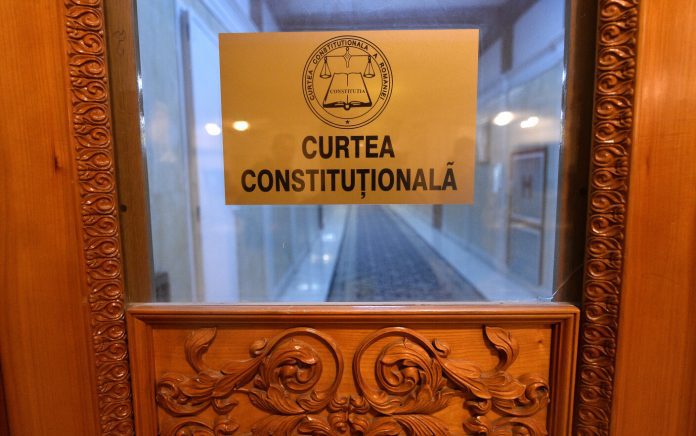The Constitutional Court of Romania (CCR) is discussing, on Wednesday, the notification of President Nicuşor Dan regarding a law initiated by deputy Silviu Vexler regarding the regime of religions.
In mid-July, the head of state notified the Constitutional Court regarding a law that amends and supplements Law 489/2006 on religious freedom and the general regime of religions, which sanctions, as in the case of priests, the unauthorized exercise of the profession of „rabbi, imam or other clerical or monastic functions, assimilated to these, at the request of religions”.
The text of the complaint was published on the Senate website, and the law complained about at the CCR was initiated by MP Silviu Vexler, president of the Federation of Jewish Communities in Romania, who also initiated the bill to combat anti-Semitism and ban legionary organizations, a bill unsuccessfully challenged by Nicusor Dan at the CCR.
In the notification posted on the Senate website, Nicusor Dan explains that, on June 28, 2025, the Romanian Parliament submitted to the president, for promulgation, the Law amending and supplementing Law 489/2006 on religious freedom and the general regime of religions.
The normative act introduces two new articles into Law 489/2006:
* In article 23, paragraph (4) is amended and will have the following content: „(4) The unauthorized exercise of the duties of priest, rabbi, imam or other clerical or monastic functions, assimilated to these at the request of the religions by the State Secretariat for Religions, constitutes a crime and is punished according to Law no. 286/2009 on the Criminal Code, with subsequent amendments and completions”.
* In Article 29, after paragraph (1), a new paragraph is introduced, paragraph (11), with the following content: „(11) Cults have the exclusive right over the religious modalities of honoring persons canonized, beatified, sanctified, listed among the righteous or recognized as their own identity symbols”.
In the opinion of the President, through the manner of adoption and its normative content, the legislative amendment was adopted in violation of certain constitutional norms and principles, namely art.1 paragraph (5), art.76 paragraph (1) in conjunction with art.73 paragraph (3) letter h), and art. 29 and art. 30 of the Constitution.
Also, the law violates art. 147 paragraph (4) of the Constitution and art. 7 of the European Convention on Human Rights, by establishing the constitutive content of an offense through infralegal acts.
The law in question expands the scope of the active subject of the crime, including the categories „rabbi” or „imam”, but also the phrase „other clerical or monastic functions, assimilated to these at the request of the cults by the State Secretariat for Cults”.
„Thus, the possibility is created for the State Secretariat for Cults to establish, at the request of the cults, other clerical or monastic functions assimilated to those of priest, rabbi or imam. Consequently, the establishment of the constitutive content of the offense of exercising a profession or activity without right, in this field, of exercising religious freedom, is not achieved exclusively by law, but can be achieved including through infralegal acts, administrative acts of the State Secretariat for Cults (…) To the same extent, the use of a vague phrase, defined by subsequent administrative acts also violates the quality standards of the law, according to art. 1 paragraph (5) of the Constitution. Art. 36 paragraph (1) of Law no. 24/2000 regarding the norms of legislative technique for the elaboration of normative acts imposes the condition that the law be clear, of a nature ‘to exclude any ambiguity, a criterion on which we consider that the provision in „the law subject to constitutional review does not comply with it,” the president added.
Nicusor Dan also criticizes the incomplete enumeration of clerical and monastic functions.
„To the extent that the criticisms previously formulated regarding the phrase ‘other clerical or monastic functions, assimilated to these at the request of the cults by the Secretariat for Cults’, used in the formulation of the sole art. point 1 of the law subject to constitutional review, these provisions remain unconstitutional, because they expressly list only the priest, rabbi and imam among the clerical or monastic functions whose exercise without right constitutes a crime, without taking into account the fact that there are other titles specific to the other religious cults recognized by law (in total 18), which are associated with their own clerical and monastic functions”, explains the head of state.
Specifically, other religious denominations recognized by law have other titles specific to them, such as: mufti (in the case of the Muslim Cult), spiritual minister/pastor (in the case of the Union of Baptist Christian Churches in Romania), elder (in the case of the Religious Organization „Jehovah’s Witnesses”).
All these titles must be taken into account by the legislator within the scope of art. 23 paragraph (4) of Law 489/2006, because, as the Constitutional Court also noted, „regardless of the name given to the personnel of each religion, the social value protected by the criminalization of the act of exercising a profession or activity without right is the same”, the notification states.
Also, criticisms of unconstitutionality can be formulated from the perspective of the fact that the text incriminates the „unlawful exercise of powers” specific to several clerical or monastic functions, the legislator ignoring that, most of the time, these powers are not established by law, as a normative act of primary regulation, but by the statutes and canonical codes of the religions, recognized by a decision adopted by the Government, at the proposal of the State Secretariat for Religions.
Another criticism of the president refers to the violation of art. 1 paragraph (5), art. 29 and art. 30 of the Constitution by establishing an exclusive right of religions over the religious ways of honoring certain persons, which violates religious freedom, but also the exercise of freedom of expression.AGERPRES




